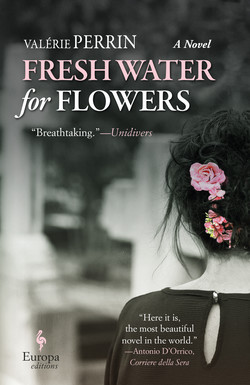Читать книгу Fresh Water for Flowers - Valérie Perrin - Страница 22
На сайте Литреса книга снята с продажи.
17.
I hear your voice in the world’s every sound.
ОглавлениеJanuary 19th, 2017, gray sky, 8 degrees, 3 P.M. Burial of Dr. Philippe Guyennot (1925–2017). Oak coffin, yellow and white roses on top. Black marble. Small gilt cross on headstone.
Around fifty sprays, wreaths, casket tributes, plants (lilies, roses, cyclamens, chrysanthemums, orchids.)
Funeral ribbons saying, “To our dear father,” “To my dear husband,” “To our dear grandfather,” “Thoughts from the class of 1924,” “Retailers of Brancion-en-Chalon,” “To our friend,” “To our friend,” “To our friend.”
On the funerary plaques: “Time passes, memories remain”; “To my dear husband”; “From your friends who will never forget you”; “To our father”; “To our grandfather”; “To our great-great-uncle”; “To our godfather”; “Thus all passes on earth, intellect, beauty, grace, and talent, like an ephemeral flower felled by a puff of wind.”
About a hundred people are present around the grave. Including Nono, Gaston, Elvis, and me. Before the burial, more than four hundred people congregated at Father Cédric’s little church. Not everyone could fit inside and sit in pews, so the elderly were allowed in first, to be seated together. Many people remained standing, gathered on the church’s small forecourt.
Countess de Darrieux told me she had thought back to when the good doctor would arrive at her home after midnight, his shirt all crumpled, and, after traveling across the countryside, he would return to make sure that her youngest’s fever had abated since morning. She said to me, “Each one of us thought back to their anginas, their mumps, their influenzas, and to the death certificates he had filled in, leaning over the kitchen table, because when Dr. Guyennot started practicing, one still died in one’s own bed, not in a hospital.”
Philippe Guyennot leaves a very fine legacy behind him. During his speech, his son said, “My father was a devoted man, who charged for just one consultation, even when he visited several times on the same day, or had placed his stethoscope over the hearts of an entire family. He was a great doctor, who made the correct diagnosis after asking three questions and looking deep into the patient’s eyes. In a world where the world hadn’t yet invented generic drugs.”
A medallion depicting Philippe Guyennot was soldered onto the headstone. The family chose a holiday snapshot where the doctor is around fifty. He’s beaming, he’s tanned, and one can see the sea behind him. A summer when he must have got a replacement, and left behind countryside and coughing fits to close his eyes in the sun.
Before blessing the coffin, Father Cédric’s last words are, “Philippe Guyennot, as the Father has loved me, I have loved you. There is no greater love than dedicating one’s life to those one loves.”
Drinks have been organized in the function room at the town hall, in honor of the deceased. I’m always invited, but I never go. Everyone leaves, except Pierre Lucchini and me.
While the stonemasons close up the family vault, Pierre Lucchini tells me that the deceased met his wife on the day of her marriage to another man. During the first dance, she had sprained her ankle. Philippe was urgently called to attend to her. When the doctor saw his future wife in her wedding dress, ankle in ice bucket, he fell in love with her. He carried her off to get an X-ray done at the hospital, and never returned her to her new, and short-lived, husband. Smiling, Pierre adds, “It’s while fixing her ankle that he asked for her hand.”
Before closing time, Philippe’s two children return. They watch the stonemasons at work. They remove the condolence cards attached to the flowers. They give me a wave before getting in a car and heading back to Paris.
